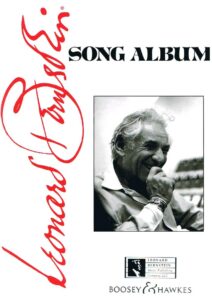Maria (from West Side Story) – Leonard Bernstein (Easy Piano Solo) sheet music, Noten

Leonard Bernstein
Best Sheet Music download from our Library.
Leonard Bernstein (August 25, 1918 – October 14, 1990) was an American conductor, composer, pianist, music educator, author, and humanitarian. Considered to be one of the most important conductors of his time, he was the first American conductor to receive international acclaim. According to music critic Donal Henahan, he was “one of the most prodigiously talented and successful musicians in American history”.
Leonard Bernstein was the recipient of many honors, including seven Emmy Awards, two Tony Awards, sixteen Grammy Awards including the Lifetime Achievement Award, and the Kennedy Center Honor.
As a composer he wrote in many genres, including symphonic and orchestral music, ballet, film and theatre music, choral works, opera, chamber music and works for the piano. His best-known work is the Broadway musical West Side Story, which continues to be regularly performed worldwide, and has been adapted into two (1961 and 2021) feature films. His works include three symphonies, Chichester Psalms, Serenade after Plato’s “Symposium”, the original score for the film On the Waterfront, and theater works including On the Town, Wonderful Town, Candide, and his MASS.
Leonard Bernstein was the first American-born conductor to lead a major American symphony orchestra.
He was music director of the New York Philharmonic and conducted the world’s major orchestras, generating a significant legacy of audio and video recordings.
He was also a critical figure in the modern revival of the music of Gustav Mahler, in whose music he was most passionately interested.
A skilled pianist, he often conducted piano concertos from the keyboard. He was the first conductor to share and explore classical music on television with a mass audience.
Through dozens of national and international broadcasts, including Young People’s Concerts with the New York Philharmonic, he sought to make music both intelligible and enjoyable to all. Through his educational efforts, including several books and the creation of two major international music festivals, he influenced several generations of young musicians.
A lifelong humanitarian, Bernstein worked in support of civil rights; protested against the Vietnam War;advocated nuclear disarmament; raised money for HIV/AIDS research and awareness; and engaged in multiple international initiatives for human rights and world peace. He conducted Mahler’s “Resurrection Symphony”” at the funeral of President John F. Kennedy, and in Israel at a world-famous concert, Hatikvah on Mt. Scopus, after the 1967 war.
The sequence of events was preserved for posterity in a documentary entitled Journey to Jerusalem.
At the end of his life, he conducted an historic performance of Beethoven’s Symphony No. 9 in Berlin to celebrate the fall of the Berlin Wall. The concert was televised live, worldwide, on Christmas Day, 1989.
Please, subscribe to our Library. Thank you!
While Bernstein was very well known for his music compositions and conducting, he was also known for his outspoken political views and his strong desire to further social change.
His first aspirations for social change were made apparent in his producing (as a student) a recently banned opera, The Cradle Will Rock, by Marc Blitzstein, about the disparity between the working and upper class. His first opera, Trouble in Tahiti, was dedicated to Blitzstein and has a strong social theme, criticizing American civilization and suburban upper-class life in particular. As he went on in his career, Bernstein would go on to fight for everything from the influences of “American Music” to the disarming of western nuclear weapons.
Like many of his friends and colleagues, Bernstein had been involved in various left-wing causes and organizations since the 1940s. He was blacklisted by the US State Department and CBS in the early 1950s, but unlike others his career was not greatly affected, and he was never required to testify before the House Un-American Activities Committee.
Browse in the Library:
His political life received substantial press coverage though in 1970, due to a gathering hosted at his Manhattan apartment at 895 Park Avenue on January 14, 1970. Bernstein and his wife held the event seeking to raise awareness and money for the defense of several members of the Black Panther Party against a variety of charges, especially the case of the Panther 21.
The New York Times initially covered the gathering as a lifestyle item, but later posted an editorial harshly unfavorable to Bernstein following generally negative reaction to the widely publicized story.
This reaction culminated in June 1970 with the appearance of “Radical Chic: That Party at Lenny’s”, an essay by journalist Tom Wolfe featured on the cover of the magazine New York.
The article contrasted the Bernsteins’ comfortable lifestyle in one of the world’s most expensive neighborhoods with the anti-establishment politics of the Black Panthers. It led to the popularization of “radical chic” as a critical term.
Both Bernstein and his wife Felicia responded to the criticism, arguing that they were motivated not by a shallow desire to express fashionable sympathy but by their concern for civil liberties.
Bernstein was named in the book Red Channels: The Report of Communist Influence in Radio and Television (1950) as a Communist along with Aaron Copland, Lena Horne, Pete Seeger, Artie Shaw and other prominent figures of the performing arts. Red Channels was issued by the right-wing journal Counterattack
